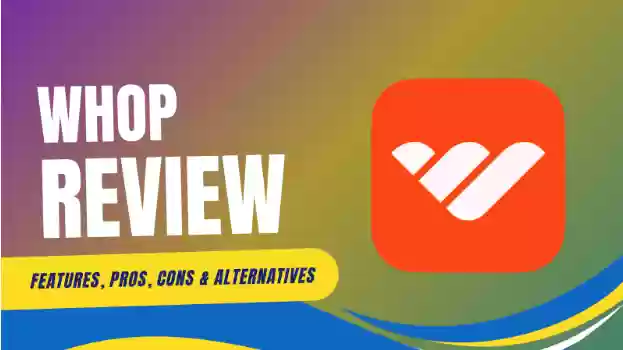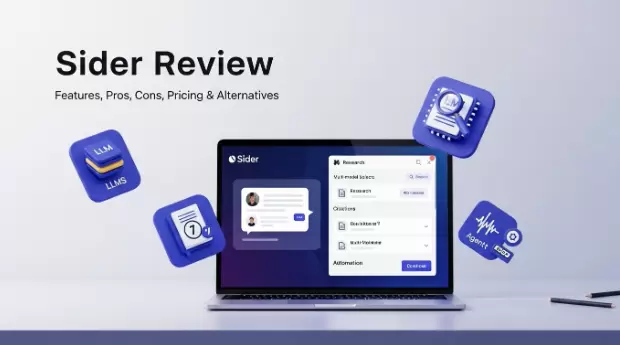Whop is a creator-first commerce tool, for creators and business owners to sell things such as digital products, memberships, and software subscriptions.” It combines a store builder, payments, and community features — like chats and forums — into one location.
Whop is trying to be like Gumroad, Patreon, and Shopify, but with a bigger focus on communities and subscription income. We’ll go over Whop’s pricing, what it does, its customer support, and the pros and cons sides, so you can see if it works for your business.
At-a-Glance (Whop):
- Best for: Creators and SaaS founders who sell subscriptions, courses, or community access. Perfect for Discord/Telegram communities, coaching groups, software licenses or any subscription business.
- Pricing: Free to start using (no monthly fees), you only pay transaction fees (2.7% + $0.30 per sale domestic; international sales cost more).
Whop Pricing (2025)
Whop has a free-to-start model – there is no monthly or setup fee. Instead, Whop charges a per-transaction fee on each sale. The base fee is 2.7% + $0.30 per successful domestic card, transaction.
International cards incur an extra 1.5% and currency conversion another 1% (so max ~5.2% + $0.30). Standard Stripe/PayPal processing fees also apply on top of Whop’s cut.
All core features are included at no extra cost: payments (credit cards, crypto, BNPL), store page builder, chat and course hosting, and the whop marketplace listing. There are no tiered plans beyond this – everyone gets the same features, so you “pay as you grow.” Below is a summary table:
Key Features of Whop
Whop provides a rich suite of features for selling and community-building. Here are the key features:
Checkout & Payments
Customers can buy via checkout links, embedded checkout widgets, or the Whop store. Whop has credit/debit cards, digital wallets, cryptocurrency, and even Buy Now Pay Later (BNPL) backed for the platform. The checkout can be branded to your company and comes with fraud prevention out of the box. Importantly, Whop’s new payment stack uses “smart routing” to auto-retry failed payments and boost conversions. In short, you can securely collect one-time and recurring payments worldwide without building your own payment system.
Integrations & Apps
Whop integrates with popular community platforms like Discord and Telegram. You can gate Discord servers or Telegram groups so that only paying members get access to special channels or content. Whop’s own App Store also offers built-in community features (chat rooms, forums, livestreams, courses, files, etc.) that you can turn on in your “whop”. This means you can bundle a group chat, course videos, or file library into a membership product. For external integrations, Whop supports webhooks and REST APIs, so developers can connect with Zapier, email tools, or custom systems.
Analytics & Reporting
Whop has it’s built in analytics to see how your business is going. The dashboard show you with revenue KPIs, customer growth and how your product is performing over time. You also receive data on affiliate referrals, conversion funnels and member behavior.
These insights allow you to understand what sells and why members cancel, so that you can experiment with pricing, marketing strategy, and content.
Developer/API Tools
For tech-savvy sellers, Whop offers powerful developer tools. You can embed the checkout on any website via the Whop.js widget or iframe. Whop stores customer payment tokens, so your code can charge repeat customers directly through the API.
There is also support for application development inside the Whop ecosystem, such as Whop’s AI App Builder and webhooks to get real-time notifications
This API access means you can integrate Whop deeply into custom websites or software products.
Pros and Cons
Pros:
- All-in-one platform: Store pages, payments, Community apps (chat, forums, courses), everything from one dashboard.
- Flexible Products: You can sell one-time or recurring products. It also allows you to bundle multiple products or apps together to make their sale easier.
- Useful Analytics: You get live insights into sales, customer cancellations, and member activity. This helps you make smart decisions without needing extra tools.
- Low Upfront Cost: There’s no monthly fee, so you can begin for free and only pay as you earn. It’s a great choice for small or new projects.
Cons:
- Transaction Fees: Whop takes a 2.7% + $0.30 cut of sales. High-volume sellers may find this adds up (compare flat-fee alternatives).
- Learning Curve: The dashboard comes with lots of features which may initially be overwhelming. Beginners might need some time to adjust to how everything works.
- Limited Customization: Store pages are templated. You can add logos and images, but deep layout or CSS customizations are limited. Sellers wanting a fully branded site may feel constrained.
- Marketplace Competition: The Whop marketplace has many sellers in popular niches. Standing out on that platform alone can be tough.
Alternatives to Whop
While Whop is feature-rich, other platforms focus on specific needs or offer different pricing models. Here are some top alternatives:
- Gumroad: A simple storefront for digital products (ebooks, music, software). It’s free to start but charges higher transaction fees (about 8–10%). Use Gumroad if you only need straightforward product sales without heavy community or subscription features.
- ConvertKit Commerce (Kit): Inside the ConvertKit email platform, Kit allows creators to send newsletters and sell digital downloads and subscriptions. It supports simple checkouts and is free up to a small $29/mo plan. Choose if you’re mainly into email marketing and now wish to monetize your mailing list.
- Kajabi: Course and membership platform that is all in one with a robust marketing tools. The pricing options start at roughly $149/mo and, along with them, you will get landing pages, email funnels, and no transaction fees. Kajabi is a good option for creators who want a full suite (and have the means) but it doesn't have a shared marketplace feature and charges high monthly fees.
Use Cases & Best-Fit Customers
- Indie SaaS Developer: Selling software subscriptions or licenses? Whop’s license key management and recurring billing make it easy. You can distribute keys automatically and gate software access via the platform. The Stripe-like payment system and refund handling save you engineering time.
- Online Course Creator: If you teach courses and want to add community, Whop lets you host video lessons and a live chat or forum on the same platform. You can bundle a course with a private Discord community for premium, students.
- Newsletter/Content Creator: For a newsletter, Whop can manage paid subscribers. You can charge monthly/yearly for your newsletter and even add bonuses like exclusive chats or AMA livestreams as part of the membership package.
In each scenario, Whop’s strengths (integrated billing + community apps + marketplace) really shine. However, if your needs are very narrow (e.g., only simple e-commerce or only email commerce), some alternatives below might fit better.
FAQ
Q: Does Whop charge a subscription or setup fee?
A: No. Whop is free to join with no monthly subscription. You only pay per transaction (2.7% + $0.30 on domestic sales).
Q: Can I create free or trial products?
A: Yes. When you add a product, Whop lets you choose a pricing model of Free, One-Time, or Recurring. You can offer free community access or free trials before requiring payment. These appear on your store page but won’t charge non-paying members.
Q: How are payouts handled?
A: Whop offers global payout options. By default, you can withdraw funds via ACH (to your bank) — next-day ACH costs about $2.50 per transfer. They offer instant USD deposits (4% + $1 fee), crypto payouts (5% + $1), Venmo/CashApp (5% + $1), and even traditional wire transfers. You can set up payouts daily or weekly, or just withdraw funds when you need them.
Q: What payment methods are supported?
A: Whop accepts credit/debit cards worldwide and digital wallets. It also supports Buy Now, Pay Later through partners like Klarna or Afterpay. A unique option is built-in crypto payments; buyers can pay with Bitcoin and major crypto via Whop’s integration. So customers have plenty of ways to pay.
Who Should Use Whop (2025)
Whop is an excellent choice for community-driven businesses and digital creators who want an integrated platform. Choose Whop if you:
- Sell recurring memberships or subscriptions (e.g., private groups, software licenses).
- Need community features (chat, forums, courses) tightly integrated with sales.
- Value marketplace exposure (Whop can help new customers find your offering).
Whop simplifies running a digital business by handling payments, access control, and community stuff all in one spot. For SaaS founders, course creators, coaches, or niche community managers, Whop often reduces complexity compared to stitching together separate tools.
Who Should Look Elsewhere: Whop may not be ideal if you need extreme customization or flat-rate pricing. If you want a fully white-label checkout (no “powered by Whop” branding) or 100% control over design, you might use a custom solution or a platform like Shopify + membership plugin.
High volume sellers with big budget might prefer a no-frills fixed-fee plan (think Kajabi or Podia) so they can avoid per-sale fees. If your business is only simple downloads with no community needs, lightweight tools like Gumroad or Stripe Checkouts could suffice at lower cost. Always match your platform choice to your specific business model and growth plan.
See our guide on choosing the Best eCommerce Platform 2025 for more context on platforms like Whop.


 Table of Content
Table of Content










